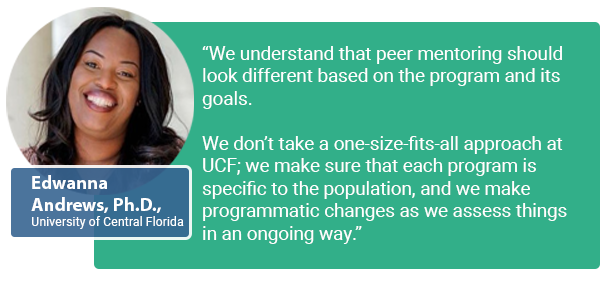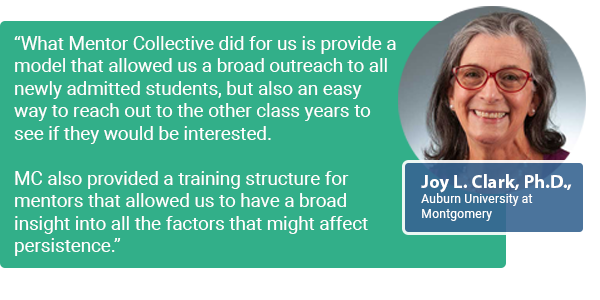How High-Quality Relationships Foster Sense of Purpose & Belonging
Feeling a sense of belonging at one’s college or university is strongly connected to a host of positive student characteristics, including persistence, engagement, and mental health. However, for many students, that sense of belonging can be more challenging to attain, especially in first-generation and historically underrepresented minority students.
On March 10, 2022, Mentor Collective held a virtual roundtable discussion with higher education experts from around the country to learn how their institutions are using guided mentoring programs to increase sense of belonging throughout their student populations, and especially in groups who may need additional resources to thrive.
The roundtable was co-hosted by the University of Central Florida (UCF)—which runs a host of successful peer mentoring programs for different student groups—with guest speakers:
- Kerry P. Welch, Ed.D., Associate Vice President for Student Engagement & Leadership Development, University of Central Florida
- Edwanna Andrews, Ph.D., Assistant Vice President, Community Support, University of Central Florida
- Joy L. Clark, Ph.D., Associate Provost for Undergraduate Studies, Auburn University at Montgomery
- Dawn Nail, Ed.D., Interim Associate Vice Provost for Enrollment Management & Head of Undergraduate Admissions, North Carolina Agricultural and Technical State University (NC A&T)
- Larry Faerman, Ph.D., Acting Vice President of Student Affairs & Enrollment Management, Florida Atlantic University
Moderator Dr. George White, inaugural managing director of student access and success (retired) and Professor Emeritus at Lehigh University, led panelists through a lively discussion.
Some key findings are below:
Make Your Mentorship Adaptable
 At the panelists’ institutions, each has found their own mentorship system that works for them and their students. For example, NC A&T scales its mentorship program to support students at three stages of the journey: first-year undergraduate, upper-division, and first-year graduate. UCF runs more than a half-dozen peer mentorship programs aimed at different audiences, from multicultural students to high-achieving First Time on Campus (FTIC) students—and perhaps more importantly, they measure the programs’ effectiveness and adapt them over time to increase impact.
At the panelists’ institutions, each has found their own mentorship system that works for them and their students. For example, NC A&T scales its mentorship program to support students at three stages of the journey: first-year undergraduate, upper-division, and first-year graduate. UCF runs more than a half-dozen peer mentorship programs aimed at different audiences, from multicultural students to high-achieving First Time on Campus (FTIC) students—and perhaps more importantly, they measure the programs’ effectiveness and adapt them over time to increase impact.
“We understand that peer mentoring should look different based on the program and its goals," said Edwanna Andrews, Ph.D., Assistant Vice President, Community Support, University of Central Florida. "We don’t take a one-size-fits-all approach at UCF; we make sure that each program is specific to the population, and we make programmatic changes as we assess things in an ongoing way.”
Creating an Expansive & Scalable Mentorship Structure is Essential
The mentoring relationship can have a ripple effect that goes beyond the one-on-one connection between student and peer. By strategically training mentors to be knowledgeable about their university, many institutions see that mentees become aware of and more likely to utilize other resources available on campus, such as career services or undergraduate research opportunities, as well as more likely to persist through to the second year and eventually graduate.
“If you haven’t hooked a new student within six weeks, you’re more likely to lose them," said Larry Faerman, Ph.D., Acting Vice President of Student Affairs & Enrollment Management, Florida Atlantic University. "That’s where that mentorship piece comes in—someone who’s checking in beyond that first six weeks and can empathize with their experience. Our data shows that student involvement is a driver of persistence, especially for those students who are least likely to persist, such as Pell-eligible students, commuters, and males. You need to bridge the gap of who wants to participate in the mentorship program because they want to take advantage of every opportunity and who actually needs it and the support it provides.”
 “What Mentor Collective did for us is provide a model that allowed us a broad outreach to all newly admitted students, but also an easy way to reach out to the other class years to see if they would be interested," said Joy L. Clark, Ph.D., Associate Provost for Undergraduate Studies, Auburn University at Montgomery. "MC also provided a training structure for mentors that allowed us to have a broad insight into all the factors that might affect persistence. It’s been a back-and-forth partnership in which we give each other feedback on how to enhance our programs going forward.”
“What Mentor Collective did for us is provide a model that allowed us a broad outreach to all newly admitted students, but also an easy way to reach out to the other class years to see if they would be interested," said Joy L. Clark, Ph.D., Associate Provost for Undergraduate Studies, Auburn University at Montgomery. "MC also provided a training structure for mentors that allowed us to have a broad insight into all the factors that might affect persistence. It’s been a back-and-forth partnership in which we give each other feedback on how to enhance our programs going forward.”
Collect—and Use—Your Data
One of the value-added benefits of the Mentor Collective partnership that several participants mentioned was the easy-to-use dashboard displaying all of the pertinent data collected over the course of a mentorship program. Chris Elia, senior partnerships director at Mentor Collective, demonstrated what that data capture process looks like, as well as the importance of informing institutions based on what they’re learning from their students.
“One of the things our data has told us is that students who engage with their mentor three or more times are more likely to persist," said Chris Elia, Senior Partnerships Director, Mentor Collective. "We can look at the data and see not only who are those highly engaged pairs, but also where are they coming from, how do they identify, what are their demographics, what are they talking about? This is how Mentor Collective can help inform you and help you be proactive.”
“We don’t have an early intervention system outside of Mentor Collective, so by using the insight flags, we can provide interventions in real time to students who are struggling," said Edwanna Andrews. "That is the great impact, to connect with those students who are having issues and get them to the appropriate resources.”
Mentor Collective roundtables encourage conversation and peer- to-peer interaction. The insights offered were valuable to university leaders as we collectively work to ensure student success. Mentor Collective strives to empower every student to form the relationships they need to build resilience, self-efficacy, and a sense of belonging.
The full recording of the roundtable discussion is available here. To start a conversation about how to utilize mentorship to engage and support your students, contact Mentor Collective today.